A Guide to the Best Calcium Supplements for Vegans Including Buying Tips + Dosage Recommendations
Calcium deficiency is prevalent worldwide. This is a fairly serious issue, given the immense health benefits of calcium for the human body. [1]
Vegans are at an even higher risk of calcium deficiency due to our strict diet. The research is clear, vegans simply don’t get enough and need to improve their calcium intake. [2]
In this article, I present to you the very best calcium supplements available for vegans to buy. I’ll also explore the best calcium-rich foods that you should be focusing on.
First, let’s begin with my list of top vegan calcium supplements. I have considered the brand’s reliability, bioavailability factor, customer reviews, and my own experience in supplementing calcium.
The Best 6 Vegan Calcium Supplements You Can Buy Right Now
Here it is, the top 10 vegan calcium supplements you can buy and where to buy them. It’s essential to read the information to decide on which calcium is best for you.
1. Garden of Life Raw Calcium Supplement
Not the cheapest on the list, but I’m a big believer in spending that little bit more for quality. I’m also a huge fan of Garden of Life products, as are most vegans. This is simply due to the credibility of the brand and the sheer amount of positive reviews of their products.
Garden of Life is a reputable supplements brand and should always be considered when looking for new supplements. Each tablet gives you 800mg of calcium derived from algae, 1000 IU of vitamin D3, 60mg of magnesium, and 80mcg of vitamin K2.
If that’s not enough to convince you, it contains ingredients that are USDA-certified organic and verified non-GMO.
The cost per serving is expensive compared to other products on this list, but you’re paying for the brand’s reputability plus the extra vital nutrients listed above.
2. MRM Vegan Bone Maximizer
MRM delivers a great-quality supplement, especially for vegans. This is not a calcium-specific supplement and has been designed to improve your bone health using a combination of cofactors that support each other.
Inside, you get your daily dose of calcium plus vitamin D3, vitamin K2, zinc, magnesium, boron, and silica. Research has shown that this product can effectively help reduce the risk of fractures and support bone density.
The product is non-GMO verified and has been tested by a third party for purity and effectiveness. It’s also completely organic and cruelty-free (obviously!)
3. Deva Vegan Calcium
Deva is another very reputable brand within the vegan community. Its calcium supplement is one of the best-reviewed and comes packed with zinc, vitamin C, boron, copper, magnesium, and vitamin D.
It is a 100% certified vegan product made with bioavailable complex and is manufactured at a GMP-certified and FDA-registered facility. The supplement has been specially created to support bone health and collagen synthesis.
The only downside to this supplement is that you need three pills a day to get your RDI. But those pills are easy to swallow, given their small size. Great for those who hate or struggle swallowing pills.
4. NATURELO Bone Strength Calcium
Naturelo is another product that is slightly on the more expensive side, but it is high-quality. Like the Deva supplement above, you’re required to take 4 capsules a day, which is too much in my opinion.
This product has an Algae & Calcium-Citrate mix, and each serving contains about 600mg of calcium. You also get a healthy 1000 IU of vitamin D3 and a good boost of K2. Altogether it includes nine different beneficial cofactors to improve absorbability and effectiveness.
You can see the full list below:
- 60mg Vitamin C
- 25mcg Vitamin D3
- 60mcg Vitamin K2
- 600mg Calcium
- 200mg Magnesium
- 8mg Zinc
- 1mg Manganese
- 50mg Potassium
5. NOW Foods Calcium & Magnesium Tablets
NOW Foods is a firm favorite among vegans. They also do a great range of sports supplements for vegans too. It’s clear the brand understands the importance of combining calcium with magnesium, hence the product name.
Each two-pill serving provides you with 1,000mg of calcium and 500mg of magnesium. However, you get no added K2 like other products on this page. But, you do get some D3 and zinc.
The reviews on Amazon are strong, and the ingredients are all certified non-GMO. It also comes at a reasonable price of $20 for a 4 month supply.
6. Natural Vitality Natural Calm Plus Calcium Drink
Unlike all the other calcium products on this list, this is a supplemental drink. Great news for any people who dislike or cannot swallow pills/tablets.
Each serving provides 230mg of calcium, which is quite low compared to others but may be suitable for some. You also get 290mg of vitamin C, 2mcg of D3, and 350mg of magnesium.
Customers report a reduction in stress and improvement in sleep [3], probably due to the dose of magnesium. Each bottle provides you a 2 month supply. Oh, and it’s unflavored so you can mix it with your smoothie or water, and you will barely notice it’s in there.
Why is Calcium Important?
Calcium is a vital mineral that our bodies require to maintain and support healthy teeth and bones. Most calcium in our body is found in our teeth and bones but is also found in our nerve cells, body tissues, and blood.
Calcium helps your body to:
- Build and maintain strong bones and teeth
- Clot blood
- Send and receive nerve signals
- Squeeze and relax muscles
- Release hormones
- Keep a normal heartbeat
As we age, our bodies absorb less and less calcium [4]. This forces our body to take calcium from our bones and can lead to conditions such as osteopenia or osteoporosis.
Osteoporosis is the most common condition caused by calcium deficiency. It is a bone disease that makes your bones weak and more likely to fracture or break.
Osteoporosis can take years to develop without you noticing. It’s therefore essential that during your younger years, you ensure you get enough calcium daily.
How much calcium do you need?
The amount of calcium required each day depends much on your age and sex. Below are the current guidelines for daily calcium intake.
| Birth to 6 months | 200 mg |
| Infants 7–12 months | 260 mg |
| Children 1–3 years | 700 mg |
| Children 4–8 years | 1,000 mg |
| Children 9–13 years | 1,300 mg |
| Teens 14–18 years | 1,300 mg |
| Adults 19–50 years | 1,000 mg |
| Adult men 51–70 years | 1,200 mg |
| Adults 71 years and older | 1,200 mg |
| Pregnant and breastfeeding teens | 1,300 mg |
| Pregnant and breastfeeding adults | 1,000 mg |
The upper limit, or max intake, for calcium, is 2000mg. If you regularly exceed this amount, you will increase your risk of health issues that include:
- Constipation
- Decreased absorption of iron and zinc
- Increased risk of kidney stone in adults
- Increased chances of prostate cancer and heart disease
It’s difficult to exceed the upper limit through food (especially for vegans). People that exceed the limit usually do so through calcium supplements. This is why it’s especially important to follow guidelines and recommendations for supplementation.
Calcium sources: vegan
Calcium is a hot topic within the nutrition world. Many of us have grown up to believe that calcium is best found in milk and dairy products.
However, there has been substantial research over the last decade that has debunked this theory. Many studies have found that calcium from dairy products may increase a person’s risk of bone health issues, including osteoporosis.
One study of 96,000 people [5] discovered that the more milk men drank during their teenage years, the more likely they were to experience bone fractures as adults. A similar study found the same was true for young girls also.
Other research has found strong links between dairy and all manner of health issues—most notably inflammation of the body, which is increasingly linked to many chronic illnesses.
Vegans looking to increase their calcium intake through food should focus on getting plenty of:
Soy Foods
The magical soybean is the bean that just keeps on giving. Soybeans are naturally very high in calcium, but some soy products are better than others.
One cup of cooked soybeans will provide you 18.5% of your RDI, but steamed edamame will give you 27.6% of your RDI.
Tofu and tempeh are also good sources of calcium. Many vegans are increasing the amount of soy they eat; from a calcium and protein perspective, this may be a beneficial trend for vegans.
So, eat your tofu burgers!
Beans, Peas, and Lentils
I can’t stress enough to other vegans how important eating beans, peas, and lentils is. They’re a good source of calcium, but they’re packed with other nutrients such as iron, zinc, potassium, magnesium, and folate that your body needs for optimal health.
The amount of calcium differs greatly depending on the type of beans, peas, and lentils you eat. Your average lentil will provide 4% of RDI per cup, whereas the winged goa bean will give you 26% RDI!
To further increase the health benefits of beans and lentils, try soaking them overnight. This will help remove anti-nutrients and make them more absorbable.
Some Nuts
Try incorporating Brazil nuts, almonds, walnuts, pistachios, hazelnuts, and macadamia nuts into your diet. If you aim to eat around a ¼ cup with each serving, you will get around 2-10% of your RDI of calcium.
All nuts contain some level of calcium. Nuts also provide you with
- Fiber
- Healthy fats
- Protein
- Antioxidants
- B vitamins
- Magnesium
- Copper
- Potassium
- Selenium
- Vitamins E and K
So…you should be eating nuts every single day. Unless you’re allergic, of course!
Seeds
Good news for vegans everywhere, tahini is the number one source of calcium from seeds! Just two tablespoons provide you with 13% of the RDI.
YOu can also get calcium from chia and flax seeds. Both of which I highly suggest you add to your smoothies every day. You get 5-6% of your calcium RFI, but you also get a burst of protein and a myriad of other healthy nutrients.
Chia seeds are also great for your digestive system. They will help keep your bowel movements regular.
Other Vegan Food with Calcium
Other vegan sources of calcium include:
- Amaranth
- Seaweed
- Certain leafy vegetables (bok choy, spinach, mustard greens, and collard)
- Fortified foods and drinks (cereal, vegan yogurt, orange juice, and plant milk)
Do vegans need calcium supplements?
There have been multiple studies on calcium and those who follow vegetarian/vegan diets. They have pretty decided that vegans should be supplementing calcium.
Why? We simply can’t get enough through plant foods. The amount of kale, soy, and nuts you would have to eat to reach your 1000/1200mg RDI every day are unsustainable and unrealistic.
There is some evidence to suggest that vegans actually require less calcium. This is because we do not need to process meat in which calcium is used to neutralize the meat’s acidity.
Much more research needs to be done to support this theory before we can claim it’s true. Current research suggests that vegans consuming less than 525mg per day risk bone fractures.
It’s therefore recommended that vegans get at the very least, 525mg of calcium per day. You can track this via a food app such as Cronometer, or you could take a calcium supplement daily for peace of mind.
What’s the difference between vegan and non-vegan calcium supplements?
Mainly the capsule.
Capsules within the medical and supplements industry are often made from gelatin. This is an ingredient created by boiling down animal bones, cartilage, and skin to create a translucent gummy-type material.
Read also: Best Vegan Gummy Bears
Vegan calcium supplements use an animal-friendly vegetable capsule that works just the same without using animals.
You also want to avoid any calcium supplement made from an oyster shell or bone meal. These are obviously not vegan-friendly.
Certified vegan supplements also guarantee that the product and company do not test on animals. If the product is not certified vegan, it may have been tested on animals, or the company may test on animals.
Always look out for certified vegan products where possible.
What’s the best form of calcium to take?
Calcium carbonate and calcium citrate are the two best forms of calcium. Calcium carbonate has the most calcium per pill. Therefore fewer capsules are needed. You should always take calcium carbonate with meals.
Calcium citrate is absorbed well in the body and can be taken on an empty stomach. Although you do get less calcium per pill. If you’re older, calcium citrate is better because it requires less stomach acid to absorb. Older people generally have less stomach acid.
You should avoid all the following forms of calcium:
- Dolomite
- Oyster shell
- Bone meal
- Calcium phosphate
- Calcium lactate
- Calcium gluconate
These are all cheaper forms of calcium that have low amounts of calcium. Some are not vegan, including the oyster shell and bone meal.
Tips for Calcium Supplementation
Get the Right Amount
Before you start supplementing calcium, you should check two things:
- How much calcium are you already getting through food? You can track this using the Cronometer App. Complete a week or two of daily tracking and find your average.
- How much calcium do you need? Check the RDI table towards the beginning of this article.
Once you know how much calcium you need per day, you can decide what calcium supplement you buy. On the list of best products at the start of this guide, you have anything from 200-800mcg per serving.
You don’t want to exceed the upper limit of calcium. This can lead to some adverse health issues.
Get the Right Tablet Size
Some calcium supplements come with big tablets and others with tiny tablets. Depending on your personal preference, make sure you get the right size before you buy it.
It’s worth noting, the smaller the tablets, the more you probably have to take one serving. So you must decide whether it’s going to be easier for you to swallow one big pill or multiple smaller tablets.
Make Sure It’s Got Vitamin D
You will notice on my list of best calcium products that they all contain a dose of vitamin D. This is because vitamin D drastically improves the absorbability of calcium in the body.
Yes, you can get vitamin D from sunlight. But it’s best to make sure you get a calcium supplement that includes vitamin D just to be safe. Just make sure you do not exceed 4000 IU of vitamin D per day.
Most of the vegan calcium supplements provide around 1000 IU.
Read more about Vitamin D here: The Ultimate Guide to the Best Vitamin D Supplements for Vegans
Final Thoughts
Calcium is essential for your body. The fact is, it’s likely that vegans aren’t getting enough solely through their food. Therefore, it’s worth taking a calcium supplement just in case.
The health issues associated with calcium deficiency aren’t immediately obvious. Osteoporosis develops much later in life after decades of calcium deficiency and is a terrible bone disease.
Buying and taking a calcium supplement is easy and affordable. For peace of mind, I recommend taking a calcium supplement such as the Garden of Life Raw Calcium daily combined with a healthy vegan diet that includes calcium-rich foods.
Reference
- Global calcium consumption appears low, especially in Asia
- Comparative fracture risk in vegetarians and nonvegetarians in EPIC-Oxford
- What You Need to Know About Magnesium and Your Sleep
- The Role of Calcium in Human Aging
- Milk consumption during teenage years and risk of hip fractures in older adults
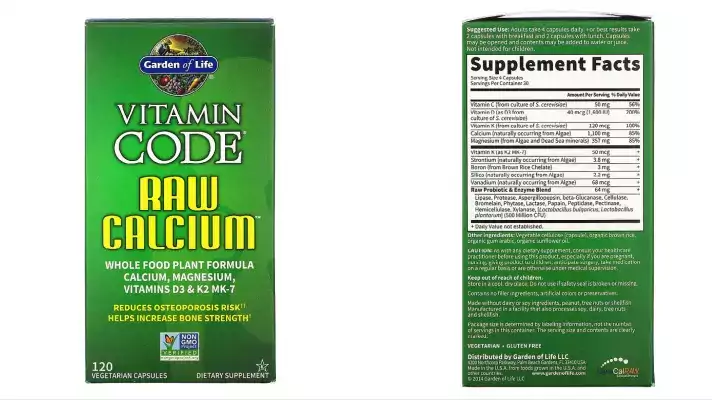

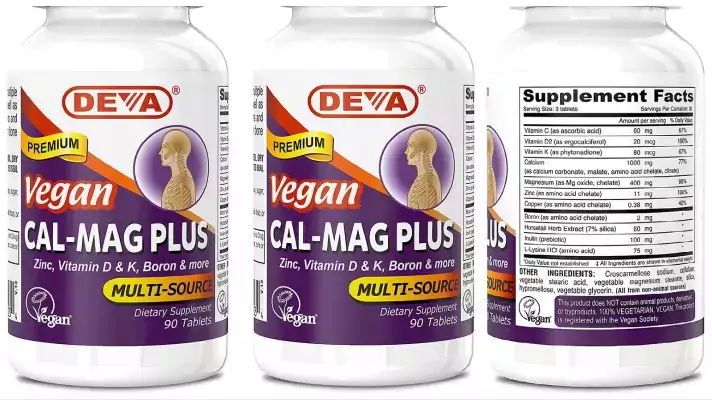

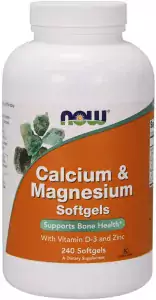
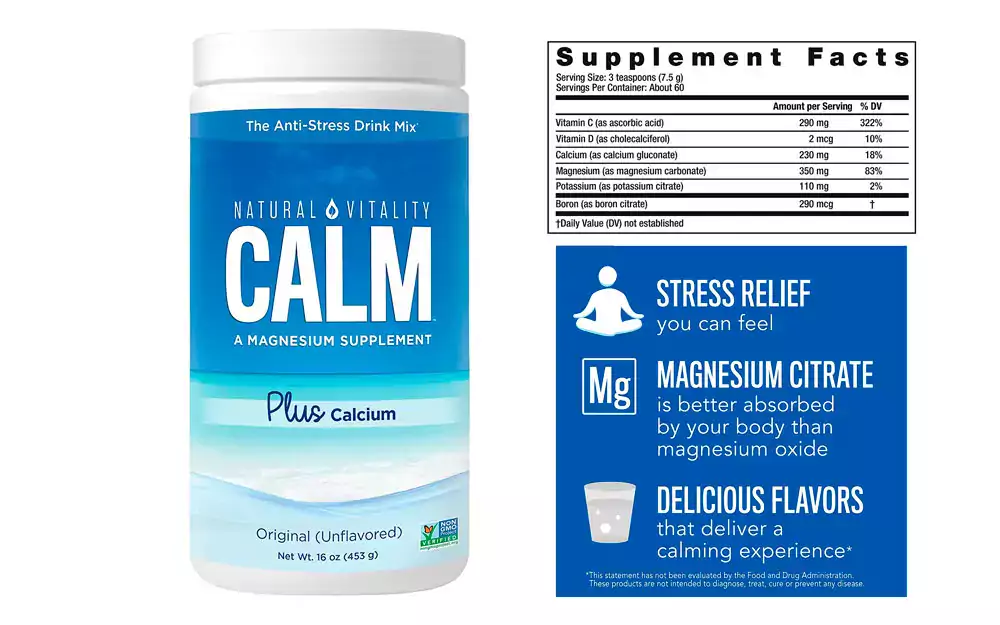


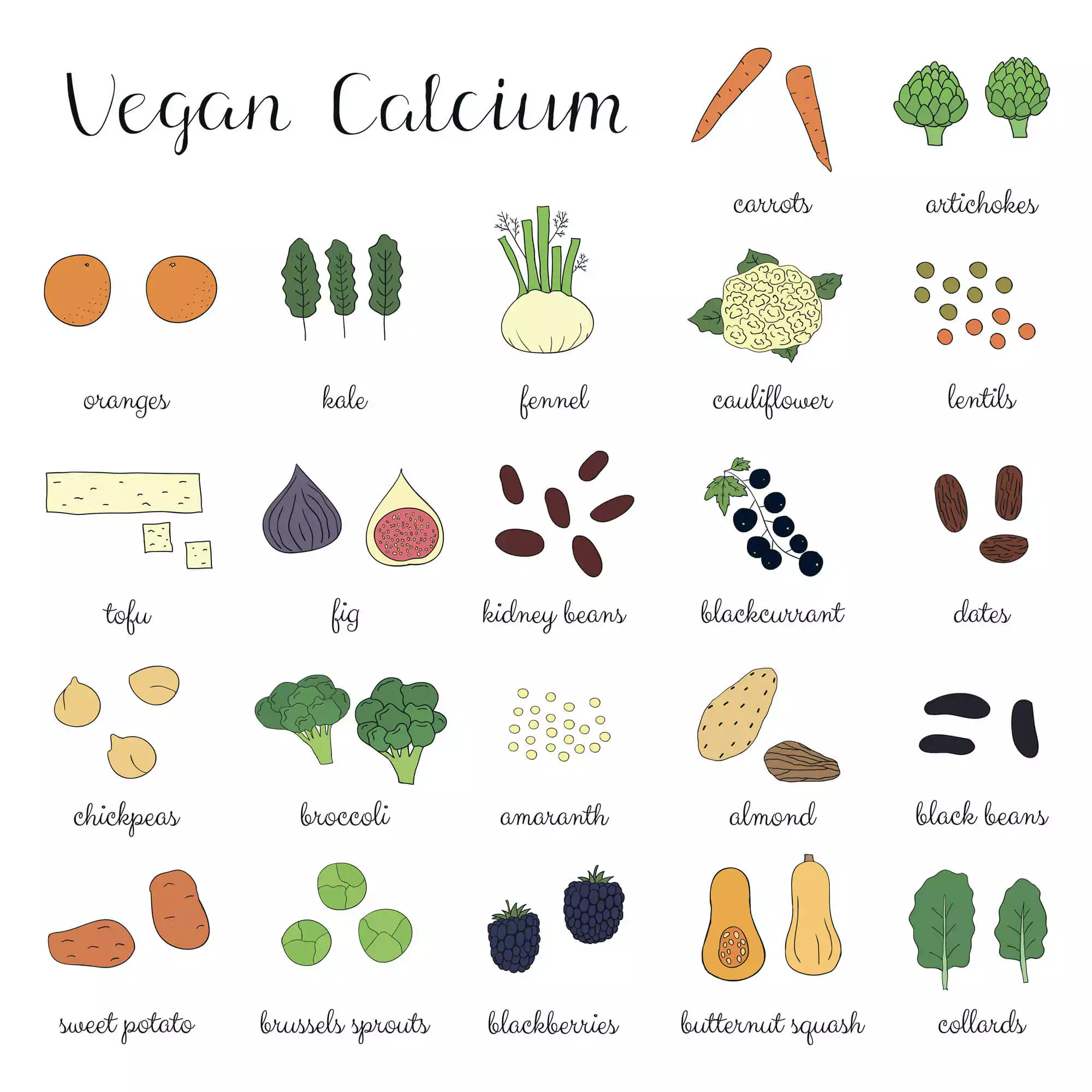

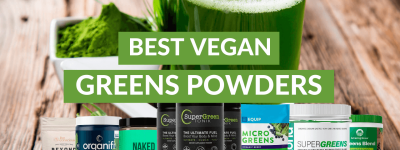

Spelling error report
The following text will be sent to our editors: